Business Law Assignment: Adrian's Payment Dispute and Contract Law
VerifiedAdded on 2022/08/22
|7
|1720
|14
Case Study
AI Summary
This case study analyzes a business law scenario where Adrian is in a payment dispute with Craig. The core issue revolves around Adrian's obligation to pay Craig an extra sum of 500 pounds for completing a task. The assignment explores relevant legal precedents, including Cutter v. Powell, Ritchie v. Atkinson, Bolton v. Mahadeva, Sumpter v. Hedges, Hoenig v. Isaacs, and Taylor v. Caldwell, to determine if Adrian is legally bound to make the payment. The analysis considers the terms of the contract between Adrian and Craig, the agreed-upon deadline, and the circumstances surrounding the request for additional payment. The conclusion, based on the application of these legal principles, determines Adrian's obligation in the given scenario, emphasizing the importance of contractual agreements and their interpretation in resolving payment disputes.
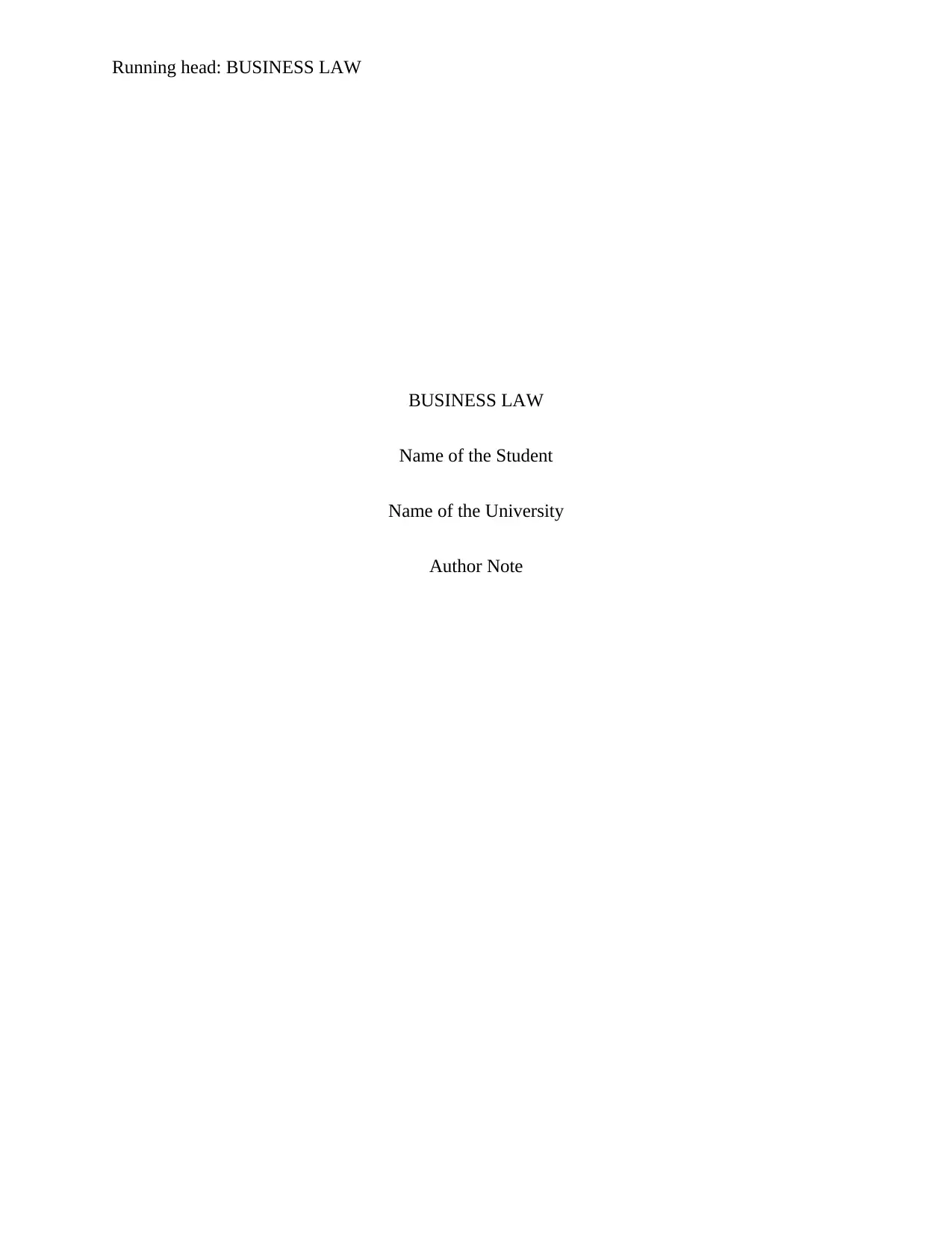
Running head: BUSINESS LAW
BUSINESS LAW
Name of the Student
Name of the University
Author Note
BUSINESS LAW
Name of the Student
Name of the University
Author Note
Paraphrase This Document
Need a fresh take? Get an instant paraphrase of this document with our AI Paraphraser
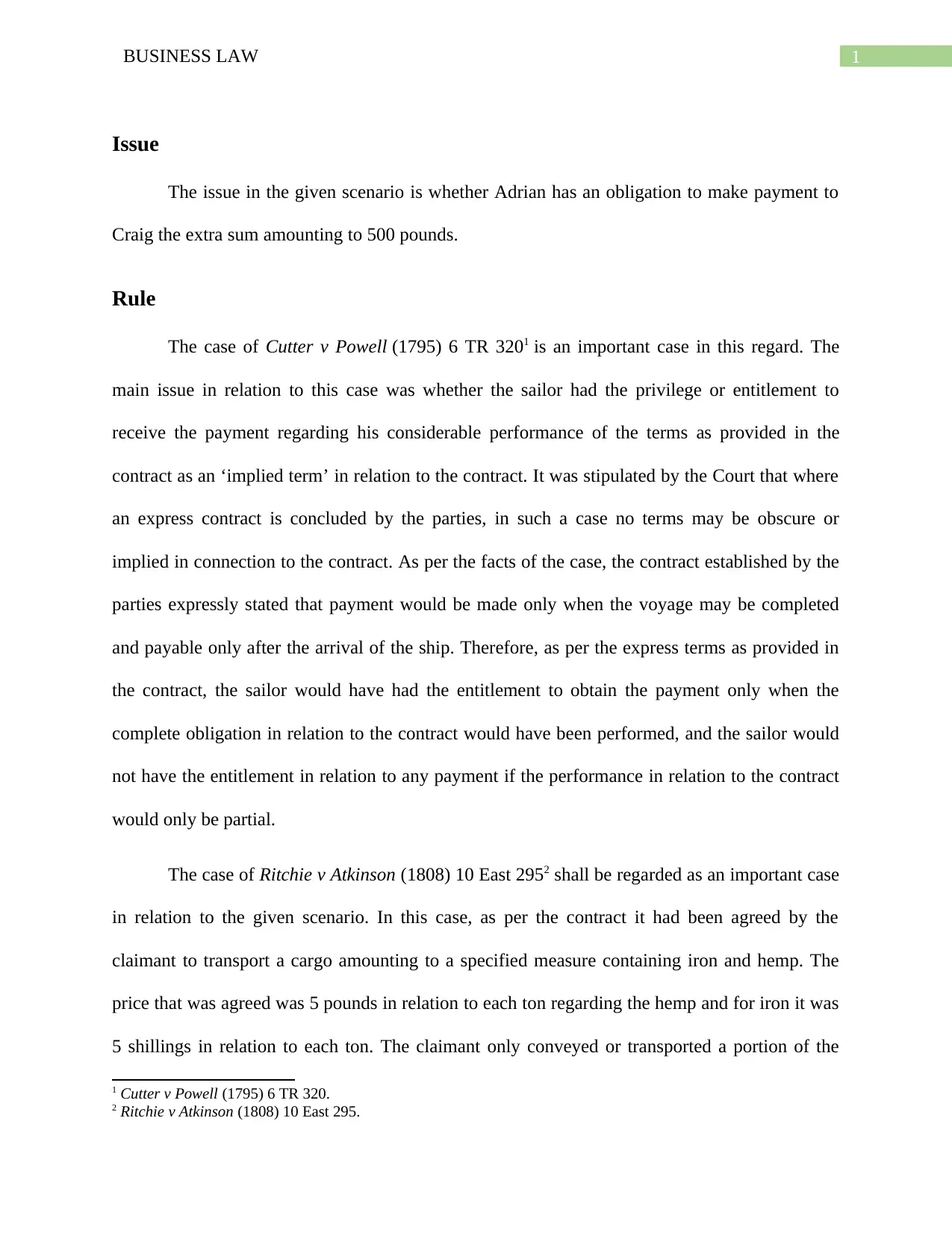
1BUSINESS LAW
Issue
The issue in the given scenario is whether Adrian has an obligation to make payment to
Craig the extra sum amounting to 500 pounds.
Rule
The case of Cutter v Powell (1795) 6 TR 3201 is an important case in this regard. The
main issue in relation to this case was whether the sailor had the privilege or entitlement to
receive the payment regarding his considerable performance of the terms as provided in the
contract as an ‘implied term’ in relation to the contract. It was stipulated by the Court that where
an express contract is concluded by the parties, in such a case no terms may be obscure or
implied in connection to the contract. As per the facts of the case, the contract established by the
parties expressly stated that payment would be made only when the voyage may be completed
and payable only after the arrival of the ship. Therefore, as per the express terms as provided in
the contract, the sailor would have had the entitlement to obtain the payment only when the
complete obligation in relation to the contract would have been performed, and the sailor would
not have the entitlement in relation to any payment if the performance in relation to the contract
would only be partial.
The case of Ritchie v Atkinson (1808) 10 East 2952 shall be regarded as an important case
in relation to the given scenario. In this case, as per the contract it had been agreed by the
claimant to transport a cargo amounting to a specified measure containing iron and hemp. The
price that was agreed was 5 pounds in relation to each ton regarding the hemp and for iron it was
5 shillings in relation to each ton. The claimant only conveyed or transported a portion of the
1 Cutter v Powell (1795) 6 TR 320.
2 Ritchie v Atkinson (1808) 10 East 295.
Issue
The issue in the given scenario is whether Adrian has an obligation to make payment to
Craig the extra sum amounting to 500 pounds.
Rule
The case of Cutter v Powell (1795) 6 TR 3201 is an important case in this regard. The
main issue in relation to this case was whether the sailor had the privilege or entitlement to
receive the payment regarding his considerable performance of the terms as provided in the
contract as an ‘implied term’ in relation to the contract. It was stipulated by the Court that where
an express contract is concluded by the parties, in such a case no terms may be obscure or
implied in connection to the contract. As per the facts of the case, the contract established by the
parties expressly stated that payment would be made only when the voyage may be completed
and payable only after the arrival of the ship. Therefore, as per the express terms as provided in
the contract, the sailor would have had the entitlement to obtain the payment only when the
complete obligation in relation to the contract would have been performed, and the sailor would
not have the entitlement in relation to any payment if the performance in relation to the contract
would only be partial.
The case of Ritchie v Atkinson (1808) 10 East 2952 shall be regarded as an important case
in relation to the given scenario. In this case, as per the contract it had been agreed by the
claimant to transport a cargo amounting to a specified measure containing iron and hemp. The
price that was agreed was 5 pounds in relation to each ton regarding the hemp and for iron it was
5 shillings in relation to each ton. The claimant only conveyed or transported a portion of the
1 Cutter v Powell (1795) 6 TR 320.
2 Ritchie v Atkinson (1808) 10 East 295.
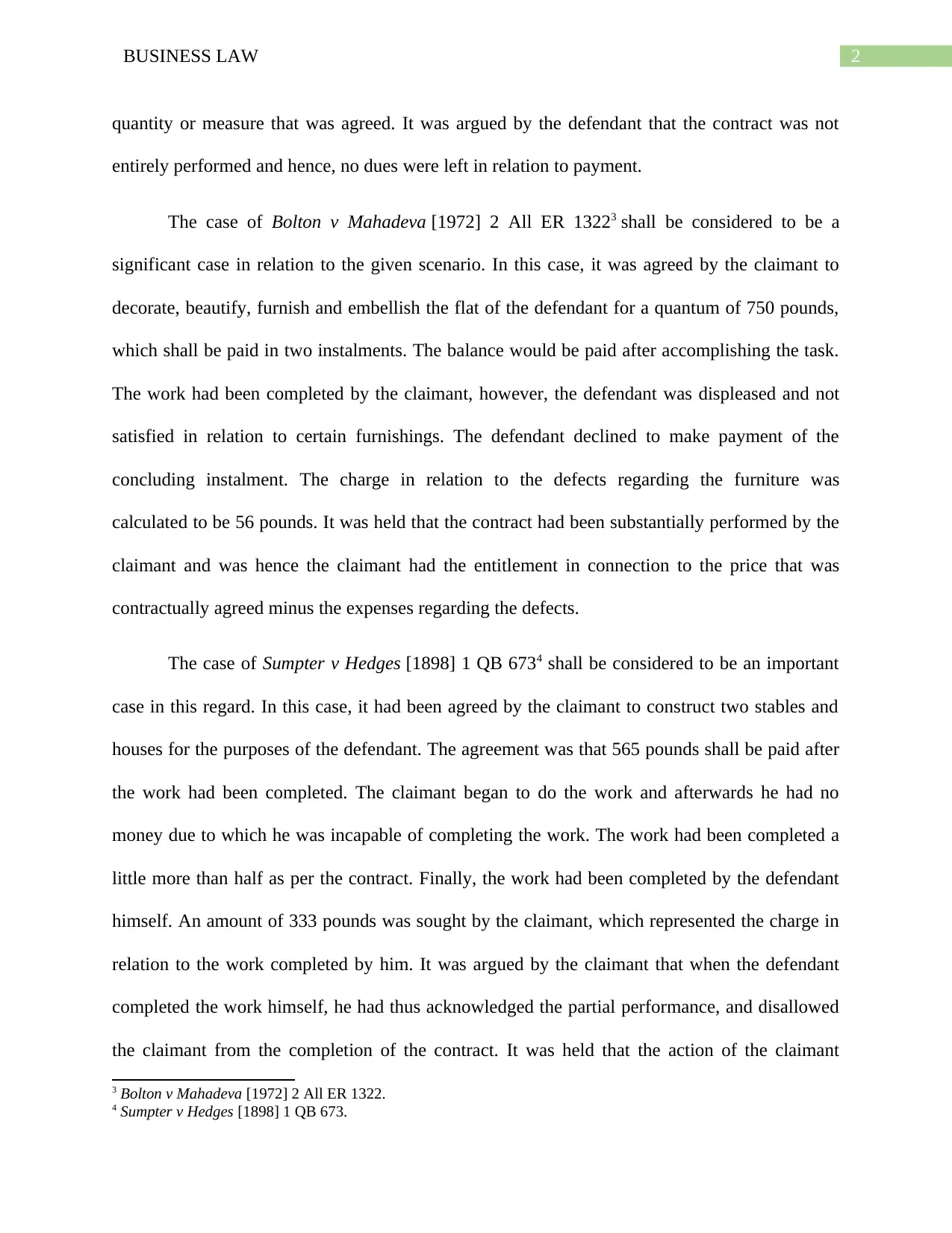
2BUSINESS LAW
quantity or measure that was agreed. It was argued by the defendant that the contract was not
entirely performed and hence, no dues were left in relation to payment.
The case of Bolton v Mahadeva [1972] 2 All ER 13223 shall be considered to be a
significant case in relation to the given scenario. In this case, it was agreed by the claimant to
decorate, beautify, furnish and embellish the flat of the defendant for a quantum of 750 pounds,
which shall be paid in two instalments. The balance would be paid after accomplishing the task.
The work had been completed by the claimant, however, the defendant was displeased and not
satisfied in relation to certain furnishings. The defendant declined to make payment of the
concluding instalment. The charge in relation to the defects regarding the furniture was
calculated to be 56 pounds. It was held that the contract had been substantially performed by the
claimant and was hence the claimant had the entitlement in connection to the price that was
contractually agreed minus the expenses regarding the defects.
The case of Sumpter v Hedges [1898] 1 QB 6734 shall be considered to be an important
case in this regard. In this case, it had been agreed by the claimant to construct two stables and
houses for the purposes of the defendant. The agreement was that 565 pounds shall be paid after
the work had been completed. The claimant began to do the work and afterwards he had no
money due to which he was incapable of completing the work. The work had been completed a
little more than half as per the contract. Finally, the work had been completed by the defendant
himself. An amount of 333 pounds was sought by the claimant, which represented the charge in
relation to the work completed by him. It was argued by the claimant that when the defendant
completed the work himself, he had thus acknowledged the partial performance, and disallowed
the claimant from the completion of the contract. It was held that the action of the claimant
3 Bolton v Mahadeva [1972] 2 All ER 1322.
4 Sumpter v Hedges [1898] 1 QB 673.
quantity or measure that was agreed. It was argued by the defendant that the contract was not
entirely performed and hence, no dues were left in relation to payment.
The case of Bolton v Mahadeva [1972] 2 All ER 13223 shall be considered to be a
significant case in relation to the given scenario. In this case, it was agreed by the claimant to
decorate, beautify, furnish and embellish the flat of the defendant for a quantum of 750 pounds,
which shall be paid in two instalments. The balance would be paid after accomplishing the task.
The work had been completed by the claimant, however, the defendant was displeased and not
satisfied in relation to certain furnishings. The defendant declined to make payment of the
concluding instalment. The charge in relation to the defects regarding the furniture was
calculated to be 56 pounds. It was held that the contract had been substantially performed by the
claimant and was hence the claimant had the entitlement in connection to the price that was
contractually agreed minus the expenses regarding the defects.
The case of Sumpter v Hedges [1898] 1 QB 6734 shall be considered to be an important
case in this regard. In this case, it had been agreed by the claimant to construct two stables and
houses for the purposes of the defendant. The agreement was that 565 pounds shall be paid after
the work had been completed. The claimant began to do the work and afterwards he had no
money due to which he was incapable of completing the work. The work had been completed a
little more than half as per the contract. Finally, the work had been completed by the defendant
himself. An amount of 333 pounds was sought by the claimant, which represented the charge in
relation to the work completed by him. It was argued by the claimant that when the defendant
completed the work himself, he had thus acknowledged the partial performance, and disallowed
the claimant from the completion of the contract. It was held that the action of the claimant
3 Bolton v Mahadeva [1972] 2 All ER 1322.
4 Sumpter v Hedges [1898] 1 QB 673.
⊘ This is a preview!⊘
Do you want full access?
Subscribe today to unlock all pages.

Trusted by 1+ million students worldwide
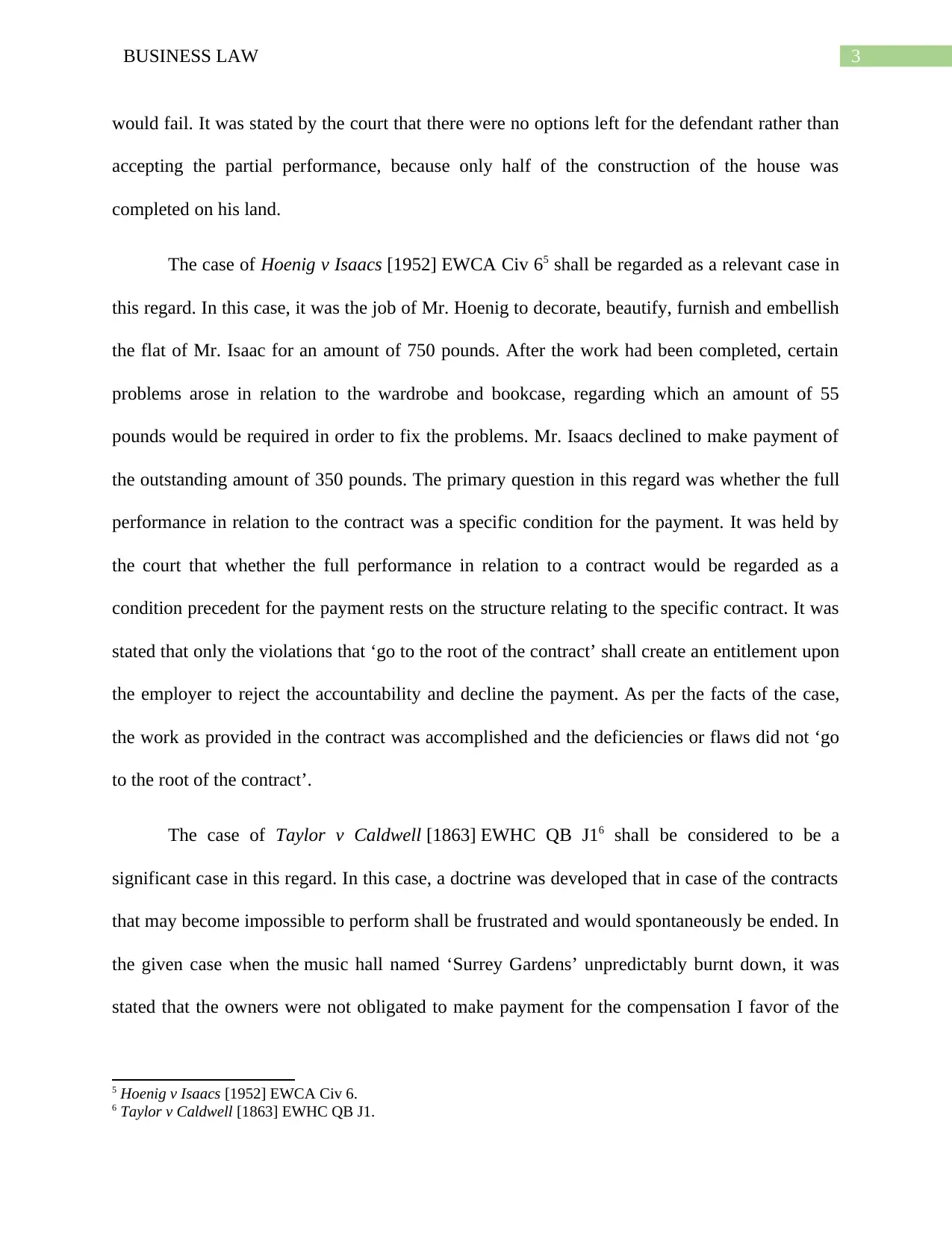
3BUSINESS LAW
would fail. It was stated by the court that there were no options left for the defendant rather than
accepting the partial performance, because only half of the construction of the house was
completed on his land.
The case of Hoenig v Isaacs [1952] EWCA Civ 65 shall be regarded as a relevant case in
this regard. In this case, it was the job of Mr. Hoenig to decorate, beautify, furnish and embellish
the flat of Mr. Isaac for an amount of 750 pounds. After the work had been completed, certain
problems arose in relation to the wardrobe and bookcase, regarding which an amount of 55
pounds would be required in order to fix the problems. Mr. Isaacs declined to make payment of
the outstanding amount of 350 pounds. The primary question in this regard was whether the full
performance in relation to the contract was a specific condition for the payment. It was held by
the court that whether the full performance in relation to a contract would be regarded as a
condition precedent for the payment rests on the structure relating to the specific contract. It was
stated that only the violations that ‘go to the root of the contract’ shall create an entitlement upon
the employer to reject the accountability and decline the payment. As per the facts of the case,
the work as provided in the contract was accomplished and the deficiencies or flaws did not ‘go
to the root of the contract’.
The case of Taylor v Caldwell [1863] EWHC QB J16 shall be considered to be a
significant case in this regard. In this case, a doctrine was developed that in case of the contracts
that may become impossible to perform shall be frustrated and would spontaneously be ended. In
the given case when the music hall named ‘Surrey Gardens’ unpredictably burnt down, it was
stated that the owners were not obligated to make payment for the compensation I favor of the
5 Hoenig v Isaacs [1952] EWCA Civ 6.
6 Taylor v Caldwell [1863] EWHC QB J1.
would fail. It was stated by the court that there were no options left for the defendant rather than
accepting the partial performance, because only half of the construction of the house was
completed on his land.
The case of Hoenig v Isaacs [1952] EWCA Civ 65 shall be regarded as a relevant case in
this regard. In this case, it was the job of Mr. Hoenig to decorate, beautify, furnish and embellish
the flat of Mr. Isaac for an amount of 750 pounds. After the work had been completed, certain
problems arose in relation to the wardrobe and bookcase, regarding which an amount of 55
pounds would be required in order to fix the problems. Mr. Isaacs declined to make payment of
the outstanding amount of 350 pounds. The primary question in this regard was whether the full
performance in relation to the contract was a specific condition for the payment. It was held by
the court that whether the full performance in relation to a contract would be regarded as a
condition precedent for the payment rests on the structure relating to the specific contract. It was
stated that only the violations that ‘go to the root of the contract’ shall create an entitlement upon
the employer to reject the accountability and decline the payment. As per the facts of the case,
the work as provided in the contract was accomplished and the deficiencies or flaws did not ‘go
to the root of the contract’.
The case of Taylor v Caldwell [1863] EWHC QB J16 shall be considered to be a
significant case in this regard. In this case, a doctrine was developed that in case of the contracts
that may become impossible to perform shall be frustrated and would spontaneously be ended. In
the given case when the music hall named ‘Surrey Gardens’ unpredictably burnt down, it was
stated that the owners were not obligated to make payment for the compensation I favor of the
5 Hoenig v Isaacs [1952] EWCA Civ 6.
6 Taylor v Caldwell [1863] EWHC QB J1.
Paraphrase This Document
Need a fresh take? Get an instant paraphrase of this document with our AI Paraphraser
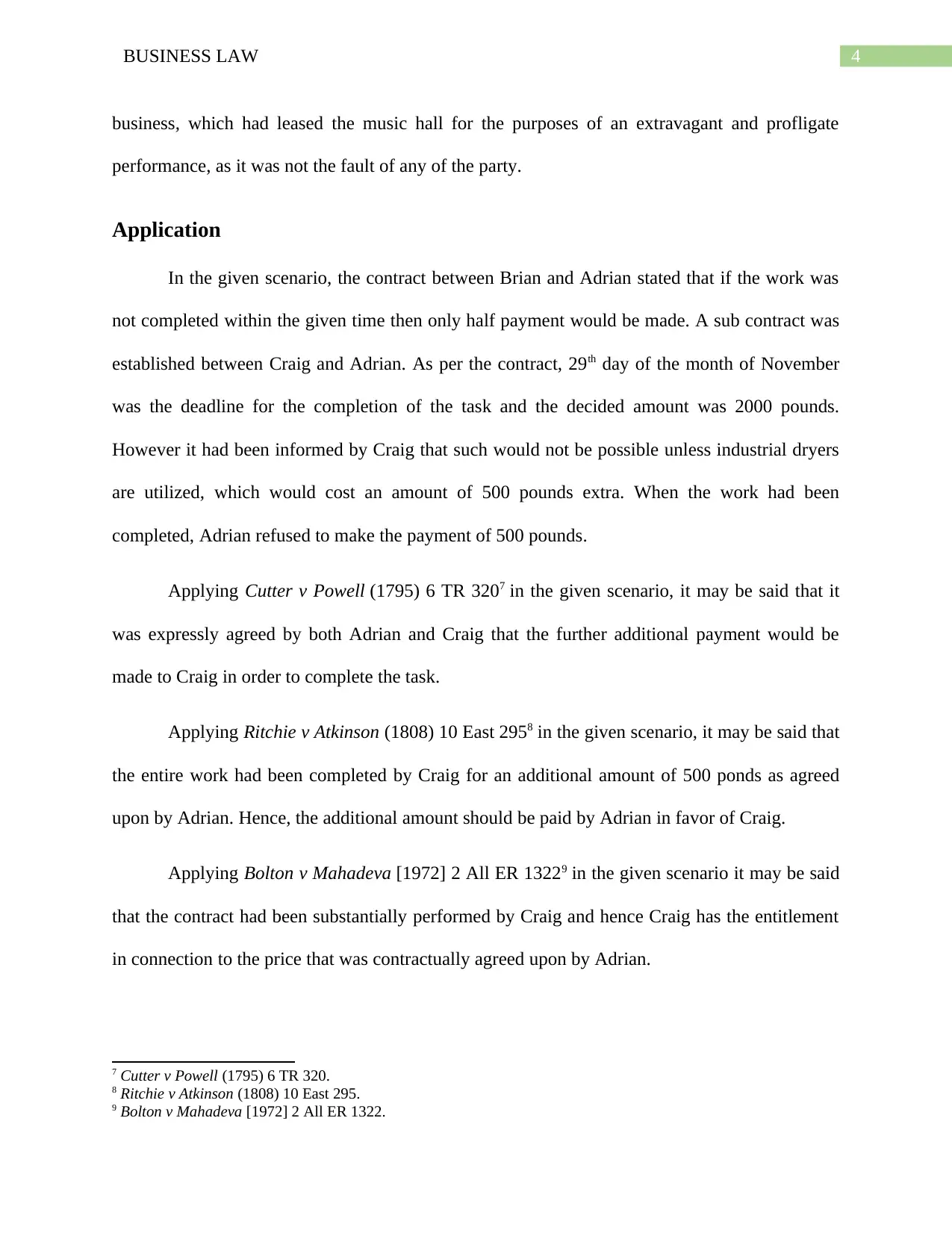
4BUSINESS LAW
business, which had leased the music hall for the purposes of an extravagant and profligate
performance, as it was not the fault of any of the party.
Application
In the given scenario, the contract between Brian and Adrian stated that if the work was
not completed within the given time then only half payment would be made. A sub contract was
established between Craig and Adrian. As per the contract, 29th day of the month of November
was the deadline for the completion of the task and the decided amount was 2000 pounds.
However it had been informed by Craig that such would not be possible unless industrial dryers
are utilized, which would cost an amount of 500 pounds extra. When the work had been
completed, Adrian refused to make the payment of 500 pounds.
Applying Cutter v Powell (1795) 6 TR 3207 in the given scenario, it may be said that it
was expressly agreed by both Adrian and Craig that the further additional payment would be
made to Craig in order to complete the task.
Applying Ritchie v Atkinson (1808) 10 East 2958 in the given scenario, it may be said that
the entire work had been completed by Craig for an additional amount of 500 ponds as agreed
upon by Adrian. Hence, the additional amount should be paid by Adrian in favor of Craig.
Applying Bolton v Mahadeva [1972] 2 All ER 13229 in the given scenario it may be said
that the contract had been substantially performed by Craig and hence Craig has the entitlement
in connection to the price that was contractually agreed upon by Adrian.
7 Cutter v Powell (1795) 6 TR 320.
8 Ritchie v Atkinson (1808) 10 East 295.
9 Bolton v Mahadeva [1972] 2 All ER 1322.
business, which had leased the music hall for the purposes of an extravagant and profligate
performance, as it was not the fault of any of the party.
Application
In the given scenario, the contract between Brian and Adrian stated that if the work was
not completed within the given time then only half payment would be made. A sub contract was
established between Craig and Adrian. As per the contract, 29th day of the month of November
was the deadline for the completion of the task and the decided amount was 2000 pounds.
However it had been informed by Craig that such would not be possible unless industrial dryers
are utilized, which would cost an amount of 500 pounds extra. When the work had been
completed, Adrian refused to make the payment of 500 pounds.
Applying Cutter v Powell (1795) 6 TR 3207 in the given scenario, it may be said that it
was expressly agreed by both Adrian and Craig that the further additional payment would be
made to Craig in order to complete the task.
Applying Ritchie v Atkinson (1808) 10 East 2958 in the given scenario, it may be said that
the entire work had been completed by Craig for an additional amount of 500 ponds as agreed
upon by Adrian. Hence, the additional amount should be paid by Adrian in favor of Craig.
Applying Bolton v Mahadeva [1972] 2 All ER 13229 in the given scenario it may be said
that the contract had been substantially performed by Craig and hence Craig has the entitlement
in connection to the price that was contractually agreed upon by Adrian.
7 Cutter v Powell (1795) 6 TR 320.
8 Ritchie v Atkinson (1808) 10 East 295.
9 Bolton v Mahadeva [1972] 2 All ER 1322.
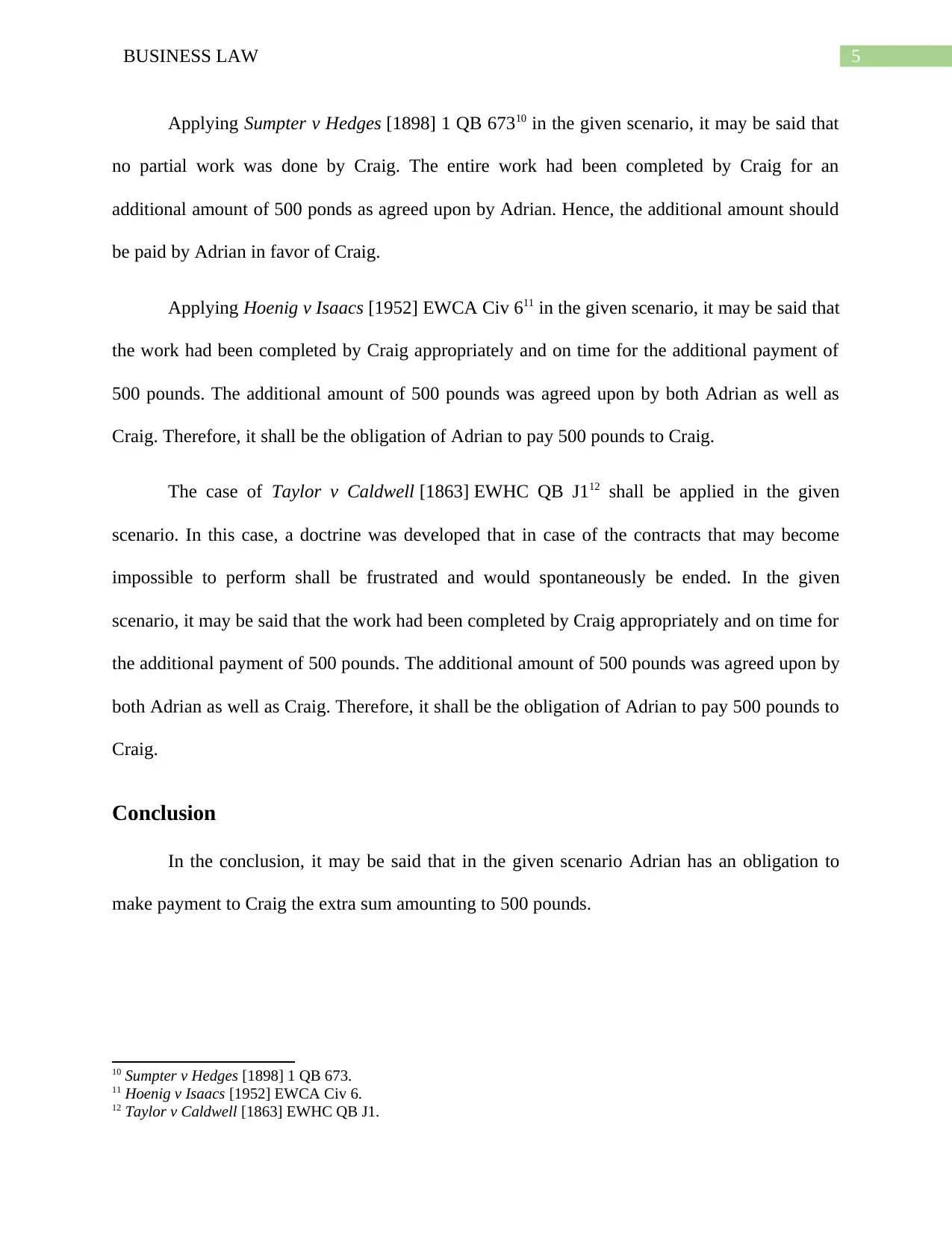
5BUSINESS LAW
Applying Sumpter v Hedges [1898] 1 QB 67310 in the given scenario, it may be said that
no partial work was done by Craig. The entire work had been completed by Craig for an
additional amount of 500 ponds as agreed upon by Adrian. Hence, the additional amount should
be paid by Adrian in favor of Craig.
Applying Hoenig v Isaacs [1952] EWCA Civ 611 in the given scenario, it may be said that
the work had been completed by Craig appropriately and on time for the additional payment of
500 pounds. The additional amount of 500 pounds was agreed upon by both Adrian as well as
Craig. Therefore, it shall be the obligation of Adrian to pay 500 pounds to Craig.
The case of Taylor v Caldwell [1863] EWHC QB J112 shall be applied in the given
scenario. In this case, a doctrine was developed that in case of the contracts that may become
impossible to perform shall be frustrated and would spontaneously be ended. In the given
scenario, it may be said that the work had been completed by Craig appropriately and on time for
the additional payment of 500 pounds. The additional amount of 500 pounds was agreed upon by
both Adrian as well as Craig. Therefore, it shall be the obligation of Adrian to pay 500 pounds to
Craig.
Conclusion
In the conclusion, it may be said that in the given scenario Adrian has an obligation to
make payment to Craig the extra sum amounting to 500 pounds.
10 Sumpter v Hedges [1898] 1 QB 673.
11 Hoenig v Isaacs [1952] EWCA Civ 6.
12 Taylor v Caldwell [1863] EWHC QB J1.
Applying Sumpter v Hedges [1898] 1 QB 67310 in the given scenario, it may be said that
no partial work was done by Craig. The entire work had been completed by Craig for an
additional amount of 500 ponds as agreed upon by Adrian. Hence, the additional amount should
be paid by Adrian in favor of Craig.
Applying Hoenig v Isaacs [1952] EWCA Civ 611 in the given scenario, it may be said that
the work had been completed by Craig appropriately and on time for the additional payment of
500 pounds. The additional amount of 500 pounds was agreed upon by both Adrian as well as
Craig. Therefore, it shall be the obligation of Adrian to pay 500 pounds to Craig.
The case of Taylor v Caldwell [1863] EWHC QB J112 shall be applied in the given
scenario. In this case, a doctrine was developed that in case of the contracts that may become
impossible to perform shall be frustrated and would spontaneously be ended. In the given
scenario, it may be said that the work had been completed by Craig appropriately and on time for
the additional payment of 500 pounds. The additional amount of 500 pounds was agreed upon by
both Adrian as well as Craig. Therefore, it shall be the obligation of Adrian to pay 500 pounds to
Craig.
Conclusion
In the conclusion, it may be said that in the given scenario Adrian has an obligation to
make payment to Craig the extra sum amounting to 500 pounds.
10 Sumpter v Hedges [1898] 1 QB 673.
11 Hoenig v Isaacs [1952] EWCA Civ 6.
12 Taylor v Caldwell [1863] EWHC QB J1.
⊘ This is a preview!⊘
Do you want full access?
Subscribe today to unlock all pages.

Trusted by 1+ million students worldwide
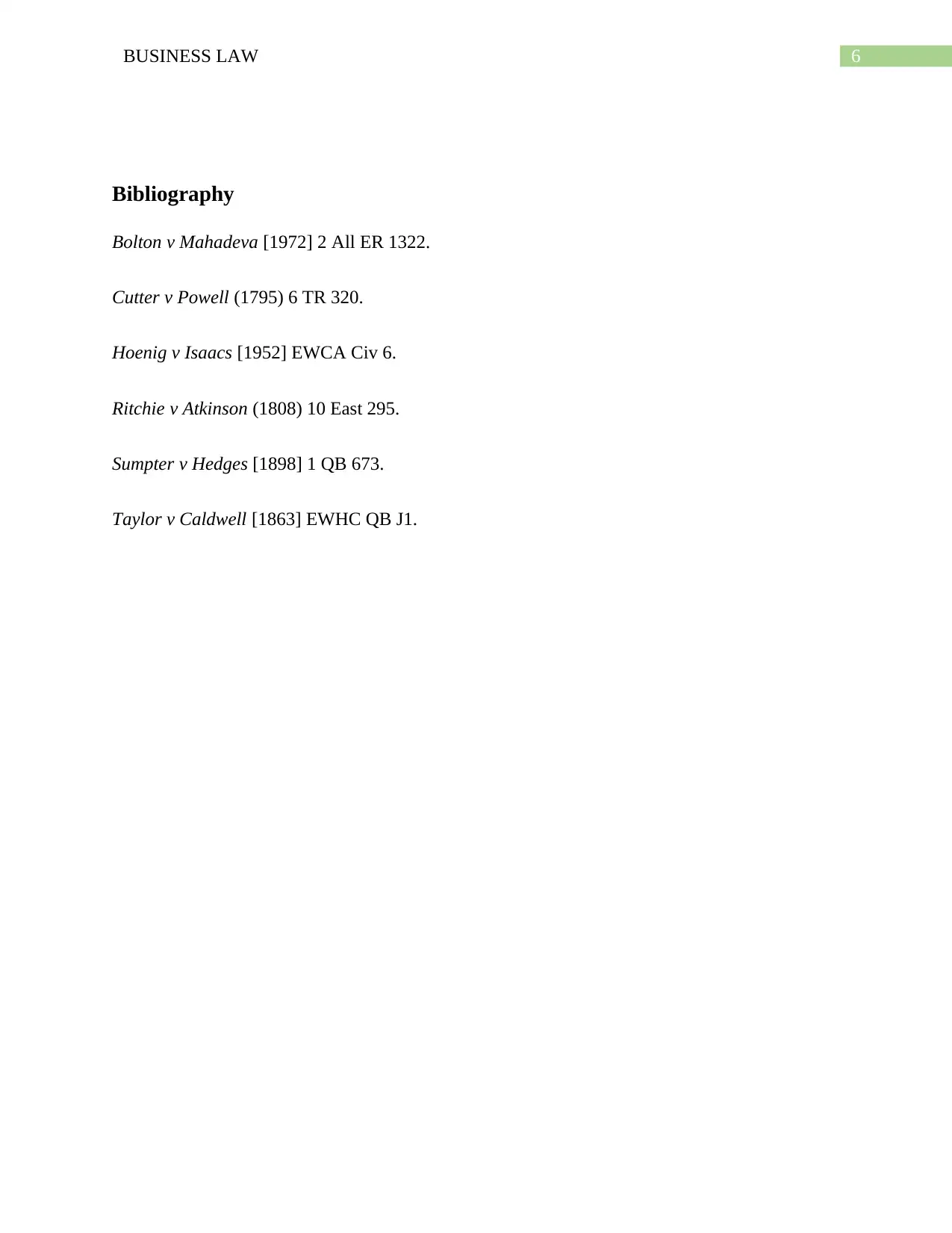
6BUSINESS LAW
Bibliography
Bolton v Mahadeva [1972] 2 All ER 1322.
Cutter v Powell (1795) 6 TR 320.
Hoenig v Isaacs [1952] EWCA Civ 6.
Ritchie v Atkinson (1808) 10 East 295.
Sumpter v Hedges [1898] 1 QB 673.
Taylor v Caldwell [1863] EWHC QB J1.
Bibliography
Bolton v Mahadeva [1972] 2 All ER 1322.
Cutter v Powell (1795) 6 TR 320.
Hoenig v Isaacs [1952] EWCA Civ 6.
Ritchie v Atkinson (1808) 10 East 295.
Sumpter v Hedges [1898] 1 QB 673.
Taylor v Caldwell [1863] EWHC QB J1.
1 out of 7
Related Documents
Your All-in-One AI-Powered Toolkit for Academic Success.
+13062052269
info@desklib.com
Available 24*7 on WhatsApp / Email
![[object Object]](/_next/static/media/star-bottom.7253800d.svg)
Unlock your academic potential
Copyright © 2020–2026 A2Z Services. All Rights Reserved. Developed and managed by ZUCOL.





